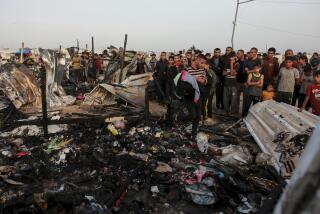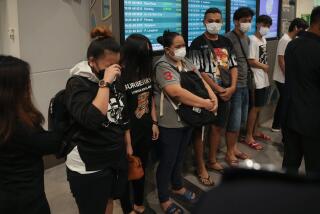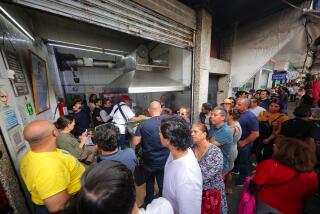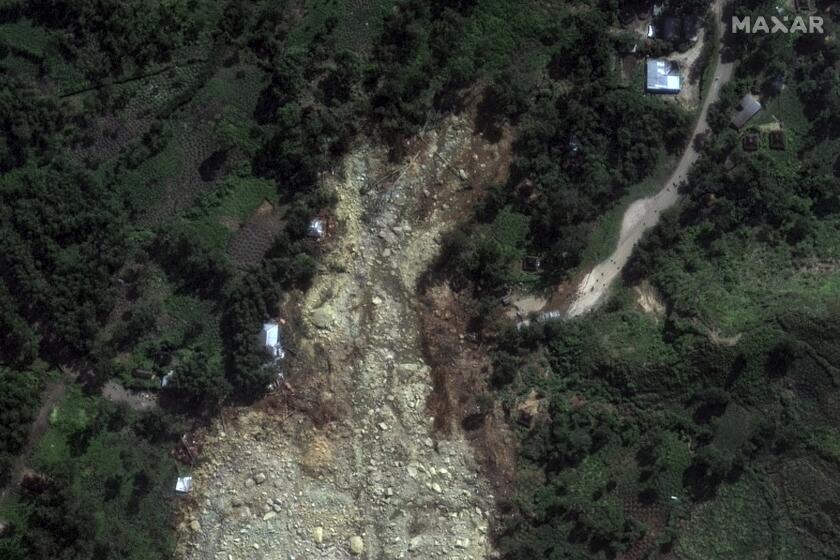Contras Free 80 Nicaraguan Prisoners of War in Peace Move
Nicaraguan contras freed 80 prisoners of war Friday and urged similar steps by the Sandinista government to end the war. Only 20 of the prisoners, however, said they were willing to return to Nicaragua.
The prisoners, half of them Sandinista army conscripts, were helicoptered from a jungle camp in Honduras near the Nicaraguan border to Honduras’ Aguacate Air Base. From there, a pilot flew them in an old DC-6 to the commercial airport in this Costa Rican farming town.
Wearing colorful new warm-up suits and impassive expressions, 78 young men and two women alighted on a rain-soaked runway, sang the Nicaraguan national anthem and were turned over to Costa Rican authorities.
Later, 20 of them boarded a bus for the hourlong journey to the Nicaraguan border. The rest said they did not want to live under Sandinista rule and would seek political asylum outside Nicaragua or join the U.S.-backed rebel army.
It was the largest batch of war prisoners freed by either side in six years of conflict.
Aristides Sanchez, one of six directors of the Nicaraguan Resistance, flew here with the prisoners, and four of the other directors welcomed the flight.
Pressure on Managua
The rebel leaders said in a statement that they were trying to bring pressure on Managua to start freeing its own 8,000 or so political prisoners under a five-nation Central American peace agreement signed August 7.
The accord will require a cease-fire, an amnesty, and restoration of civil freedoms in Nicaraguan by Nov. 7. The rebels will have to stop receiving U.S. aid and free all prisoners by that date.
On Sunday, Nicaraguan President Daniel Ortega pardoned 16 citizens of other Central American countries who had been captured while fighting alongside the contras. However, Sandinista officials have said the amnesty will be limited to contras who surrender and some but not all prisoners.
Alfonso Robelo, a resistance leader, said: “We are not only releasing five times as many prisoners (as Ortega did) but we are releasing Nicaraguans.” He said the contras were holding 30 more prisoners and would free them “in the coming weeks.”
Hernan Garron, Costa Rica’s public security minister, took custody of the contra prisoners at the airport and called their freedom “ a step toward ending the bloodshed in Central America.”
As the freed prisoners lunched on rice and beans at the Civil Guard headquarters here, Garron told them they had a choice of returning to Nicaragua, receiving political asylum in Costa Rica or going to another country.
In releasing the prisoners here, the contra leadership apparently meant to embarrass the Sandinistas by focusing the attention on the reluctance of some to go back home.
Besides army conscripts, the prisoners included peasant farmers who were seized in war zones as suspected Sandinista informers and contra combatants accused of being government infiltrators.
Some were held by the contras for more than three years and, judging from some of their remarks, were heavily indoctrinated in the anti-Sandinista cause.
After lunch, Nicaragua’s second-ranking diplomat in Costa Rica, Carlos Sequeira Molina, met with the prisoners in an auditorium and asked how many would return to Nicaragua. Eighteen raised their hands.
In unusually blunt language, several former prisoners rose to criticize Sandinista rule. Some said they could not face life in the war zones or the prospect of re-induction into the army.
‘Tired of Militarism’
“I am just tired of militarism,” declared Jose Guerrillmo Garcia, 28, who said he wanted Costa Rican citizenship.
“We do not want to pressure you,” the diplomat said. “If you want to go back the door is open, even if you oppose the government. The peace process under way in Nicaragua needs the participation of Sandinistas and anti-Sandinistas.”
“The Sandinistas are suffocating the young people,” Hector Mendoza, a 23-year-old conscript, said in retort. “ They are never going to democratize Nicaragua. It has been 40 days since the peace plan was signed and they have done nothing.”
The Nicaraguan diplomat commented later, “You have to take account of the psychological pressures these boys were subjected to.”
As the Nicaragua-bound prisoner group lined up for tetanus and diphtheria shots, two more young men decided to join it.
Jose Antonio Lanzas, a peasant who was captured by the contras, said he feared being seized again by either army if he goes home. “But I must go,” he added. “My whole family is there, my whole life.”
Another returning home was Rufo Hernandez, a soldier in the army reserves. He said he had been severly beaten on the ears during interrogation by his captors and kept in a windowless, log hut with 60 other prisoners.
He said he was beaten again after he denounced his treatment to a group of U.S. congressmen visiting the camp in July, 1986.
Many other prisoners said they were not mistreated and became sympathetic to the contra cause during captivity.
“When I joined the Sandinista army I was told I would be fighting gringos and mercenaries,” said Richard Lugo, the 17-year-old son of a former Sandinista navy commander. “But I saw with my own eyes a resistance army of peasants and young people fighting for their ideals.”
Lugo was one of nine government soldiers captured in a battle in northern Nicaragua last June 19 and released Friday. He said he considered joining the contra army but has decided to finish high school in Costa Rica.
Six men, including a father and son, said in interviews that they intended to fight for the contras. Three of them said they fought for the contras before being imprisoned as Sandinista infiltrators. They said they were absolved of the charges and then told they could return if they took part in the prisoner release.
These accounts, backed up by two pro-Sandinista soldiers could not be confirmed by rebel leaders.
Most of the prisoners were freed from the Yamalis rebel camp in southern Honduras. Since early this year the contras have been under pressure from the Honduran government to dismantle their border camps, a step now required under the peace accord.
Because Honduras is sensitive to the camps’ continued existance, contra leaders chose to release the prisoners in Costa Rica. They declined to say where the freedom flight came from, but the information was provided by prisoners.
Meanwhile, in Managua, Nicaraguan officials rejected a proposal by Costa Rican President Oscar Arias Sanchez that they negotiate a cease-fire with the contras through mediation by the Nicaraguan Roman Catholic cardinal.
President Ortega reiterated the Sandinista government’s long-standing position that it will only talk to the U.S. government, not to the U.S.-backed rebels, but Costa Rican officials said privately they felt their initiative was still a possibility.
“They did not reject such a dialogue (on a cease-fire), but what they do not want is to appear as if they are being pressured,” said a Costa Rican official who asked not to be identified.
The cease-fire proposal was presented to Ortega during a two-day meeting of Central American foreign ministers to work out implementation of a regional peace plan signed in Guatemala Aug. 7. The foreign ministers agreed to meet next in Costa Rica Oct. 27 and 28.
While saying they refuse to meet with contra leaders, Sandinista officials recently have said that they are willing to talk with the rebel field commanders inside Nicaragua to work out details of a cease-fire.
El Salvador officials at the Managua meeting said President Jose Napoleon Duarte and leftist guerrillas were nearing an agreement to hold cease-fire talks within two weeks. They declined to give further details.
Times Staff Writer Marjorie Miller contributed to this article from Managua.
More to Read
Start your day right
Sign up for Essential California for news, features and recommendations from the L.A. Times and beyond in your inbox six days a week.
You may occasionally receive promotional content from the Los Angeles Times.






